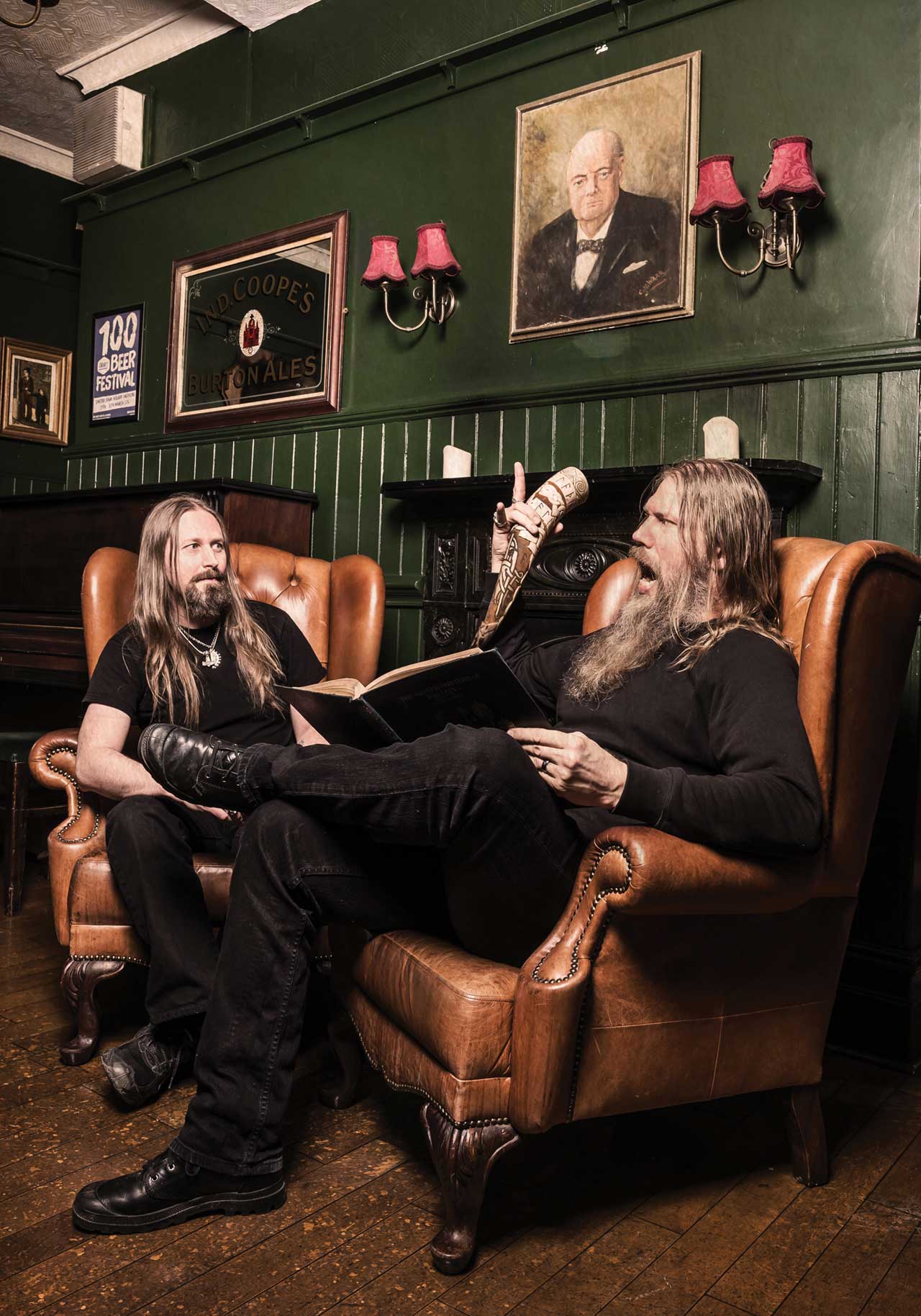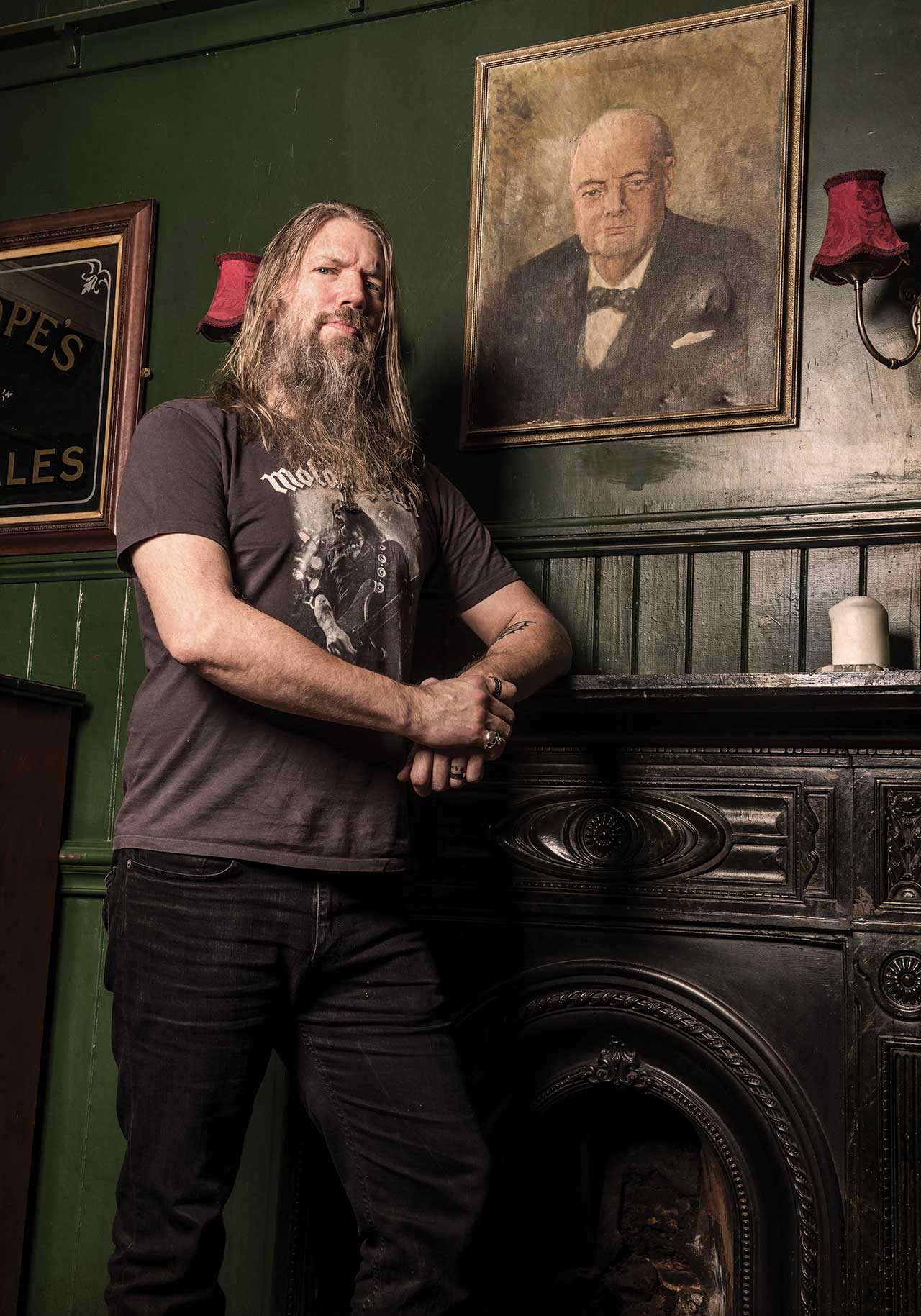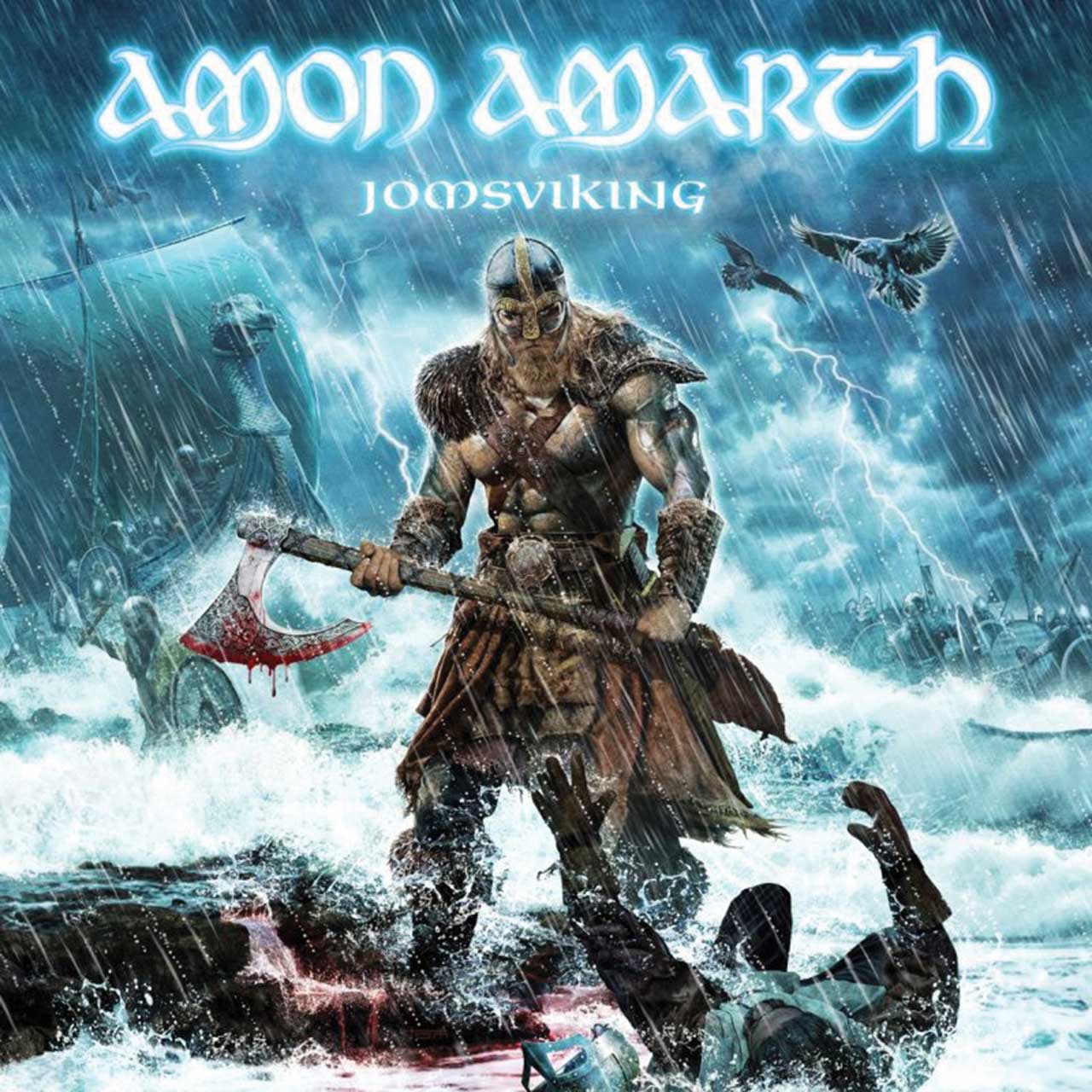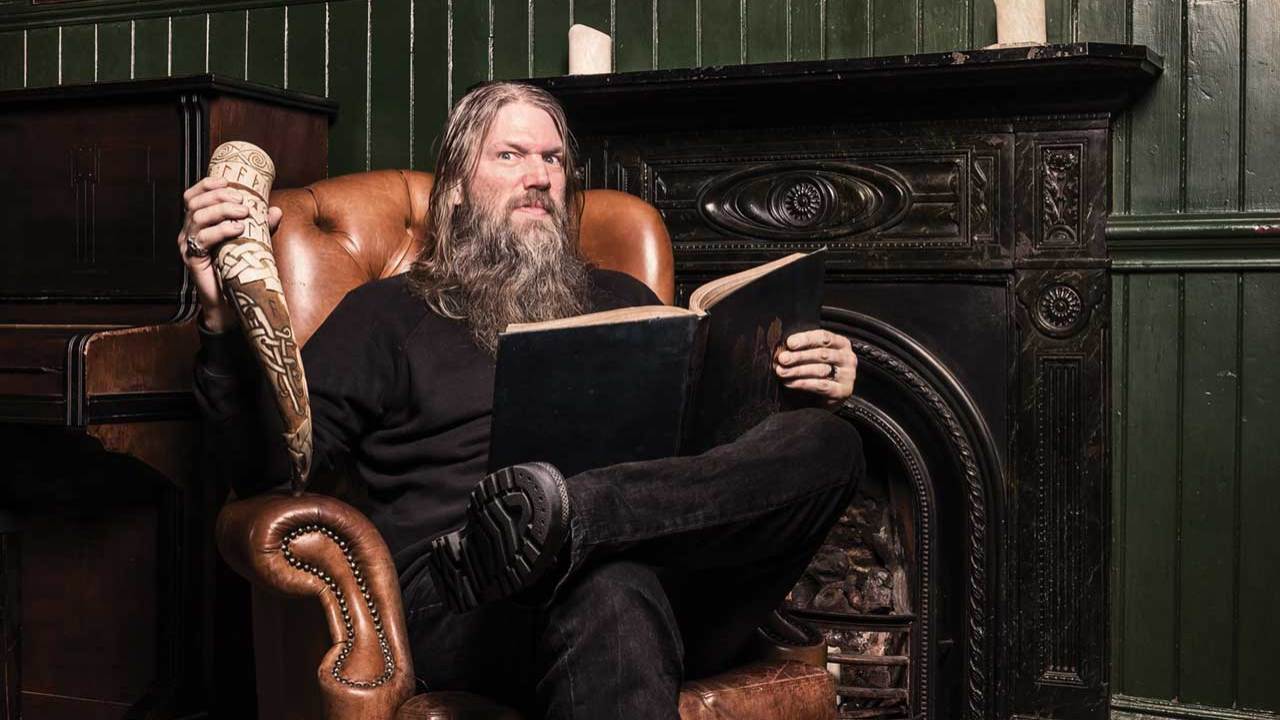Easing into a brown leather chair in front of a fire, and opening a large book in front of him, Amon Amarth frontman Johan Hegg lets out a deep, beard-shaking laugh. “Let’s start at the beginning!” he quips.
The Swedish metallers have been singing about Norse mythology for years, but their new record, Jomsviking, is their first true concept album – and it’s based on an epic story written by Johan himself. His primary inspiration was the Jomsvikings, a fearsome clan of warriors from the 10th and 11th century who would accept anyone willing to swear allegiance to their cause.
“The Jomsvikings were a mercenary elite force,” explains Johan. “They had a legendary castle in what was probably northern Poland, and a bay with about 300 ships, so it was a massive fortification. It was a brotherhood, with very strict rules, and they were some of the fiercest and best warriors ever in the Viking community – it was like the Viking special forces!”
Johan’s love of Viking writings stretches right back to childhood, where he was surrounded by tales of fury and fire both at home and at school. “It started early for me,” he recalls, sipping on an ale in the cosy confines of The Craft Beer Co. pub in north London, while the wind blows fearsomely outside. “My older sister was very much into it. Then in school we read some sagas and legends in literature classes when I was about 10.”

Continuing Johan’s family connections with the tales, it was his wife who reintroduced him to the Jomsvikings a few years ago when she gave him a copy of the 13th-century Icelandic Jómsvíkinga Saga as a birthday gift, sparking a desire in him to explore the group in his own writings. The result is arguably the band’s most ambitious work to date – Jomsviking is a tale of hardship and doomed romance, following the life of a man who only enters the mercenary gang after his attempt to elope with a woman engaged to another goes awry.
“He wants to run away with her but they get caught,” he begins, setting the scene. “There’s a big fight and he accidentally kills this guy. So he tries to run away with her, but she refuses, and he has to flee on his own. She doesn’t want to go, she’s already determined, ‘This is my past, I need to move on, I’ve something good going on here.’ But he can’t move on. So we follow him as he joins the Jomsvikings and then comes back to take his revenge and, for him, hopefully win her back. But when he comes back, she’s even less interested. They have this meeting where she threatens to kill him if he doesn’t leave, and he’s not prepared for that…”
There’s a big fight and he accidentally kills a guy
Johan was also influenced by his film debut, playing the plundering, 9th-century Viking warrior Valli in 2014’s Northmen – A Viking Saga, turning his thoughts into a screenplay rather than a novel or short story. “I mean, it’s not like I was in a film and then said, ‘OK, I want to make one as well,’” he muses. “I just had the idea of the story and wanted to see if I could do it – but the fact it became a movie script [as well as an album] was probably because of that.”
It was his first attempt at writing something on such a grand scale and, unsure how it would turn out, he kept it a secret from his bandmates, despite penning it on tour while sharing a bus with them. While they rolled through the US, Australia, Europe and South America, he’d hole up by himself and put the movie in his mind into words. “I thought he was playing computer games,” smiles guitarist Johan Söderberg. “We were in Mexico or something before he showed us what he was doing.”
He worked on his masterpiece for more than six months, whenever the band’s schedule allowed it. “I kept it quiet because I didn’t know what was coming out of it,” explains the vocalist. “I didn’t know it was going to be this huge script that was going to be our next album – it was just this cool story. It was only when we started talking about what we were going to do for the next record that I presented it to the guys, and by that point I had written half of it.”
When Johan revealed what he’d been working on, his band-mates were initially overwhelmed by the scope of the project, and wondered how they’d be able to distil the essence of the story into songs. Their first attempt at structuring a concept album, setting a pace for the story and keeping each song exciting, provided fresh challenges for a band approaching their 25th birthday.
“I remember the first time I actually saw the script, I thought, ‘Well, he’s going to need 25 songs to cover this,’” says the guitarist. “But Johan basically kept stripping it down until we ended up with one song too many for the lyrics. Actually, when we first started writing the music, we did not look at the script so much. But once we had the beginnings of the songs, then we read the story to see, ‘Ah, this sounds like it could fit in with this part’, and so on. In the past, you just wrote whatever came up; now we had a fixed running order and making that interesting was hard. In that sense, Jomsviking was the hardest album we have ever done.”
Johan’s bandmates were also sceptical about the story’s focus on romance, but came round when he told them about the suitably grim finale he had in mind.
“We want to make brutal music, and maybe a love story doesn’t suit that so well,” says Johan the guitarist with some seriousness. “But since it has a twist where actually in the end she tries to kill him, it works within our music as well. That’s something else we’ve done on previous albums; we have a story that always ends fairly tragically. The last song is usually about someone who dies…”
While all of Amon Amarth are interested in Viking legends, Johan concedes that he’s the driving force behind their obsession; he introduced the theme, and he’s the one who keeps pushing them forward.

“Bringing this subject into the band was probably my fault,” he chuckles. “But that didn’t happen as early on as people think. Around [our fourth album] Versus The World, I remember our label boss of the time saying, ‘You should stick with this – it’s what people love.’ And we said, ‘Yeah, we really like it, too, but maybe eventually it will get boring.’ Because especially at the end of the 90s, what we did was not popular – except in Germany – and we were thinking of breaking out of it because it wasn’t taking us anywhere. Before that, I dabbled with traditional blood and gore stuff, and also political stuff – for example, I had one song about destroying the environment. I’m still very pro-environment, but it’s not necessarily anything I need to bring up in our music.”
But there’s a reason why the Viking sagas have endured through the ages, and why Amon Amarth keep revisiting the topic. While their lyrics may seem like a straightforward combination of escapism and history, Johan has traditionally imbued his stories with teachings that remain as true today as they were then. “For us, this Viking theme has always been a little bit about entertainment and a bit about education, because the Viking philosophy can encourage and inspire people,” he says.

The band’s 10th album offers a lesson in leaving old experiences behind, and turning your face to a more positive future. “If you want to boil the story down to two words, it’s about ‘letting go’,” he says thoughtfully. “If you can’t let go of your past, you’re doomed. Sometimes life doesn’t turn out the way you want, and if you can’t move on, if you cling to how you’ve been wronged, you’re not going to be a happy person. I think we’ve all been there.”
Universal in theme and epic in proportion, Jomsviking could easily be translated to the silver screen. Johan has sent his 140-page script to someone in the film business to see if there’s a possibility of making it happen, though remains modest about its prospects.
“The movie industry is hard – there are so many talented writers out there – I’m not getting my hopes up,” he says humbly. “If you made a movie of this, it’d have to be done right, or it’d look cheesy. The movie in my head when I was writing was something like Gladiator – super-epic and grand – and making something like that is costly, so I’m not quick to believe that will ever happen. But you can have your dreams, right?!”
And with that, he finishes his beer and settles back contentedly in his chair, looking every bit the raconteur as well as the frontman.
I Am The Lore
Want to get into Norse mythology? Then you need Johan Hegg’s bare essentials…
THE EDDA (Snorri Sturluson, Iceland, 13th century)
Johan: “If you want to get into Norse mythology, read The Edda. Start with the Old Norse Prose version: it kind of explains how you should read the Poetic version, which is in verse and quite complex.
EGIL’S SAGA (Unknown, believed to be Snorri Sturluson, Iceland, 13th century)
Johan: “A saga about Iceland’s last pagan. He killed his first person when he was seven years old, he was brutal, and he died of old age without ever converting to Christianity.” (“Although ‘old age’ in those days was about 40,” adds Johan Söderberg.)
NJÁLS SAGA (Anon, Iceland, 13th century)
Johan: “Njáls Saga is a heroic epic, but it has betrayal, love and all these aspects, and is often described as the first novel in the western world. It’s absolutely amazing.”
THE LONG SHIPS (Frans G. Bengtsson, Sweden, 1941 & 1945)
Johan: “A really good book, even though it’s not old. It’s funny and it has the essence of the Sagas. It’s got a good portion of this gallows humour, which is what I like about the old sagas.”
Jomsviking is out on March 26 via Sony CMG
